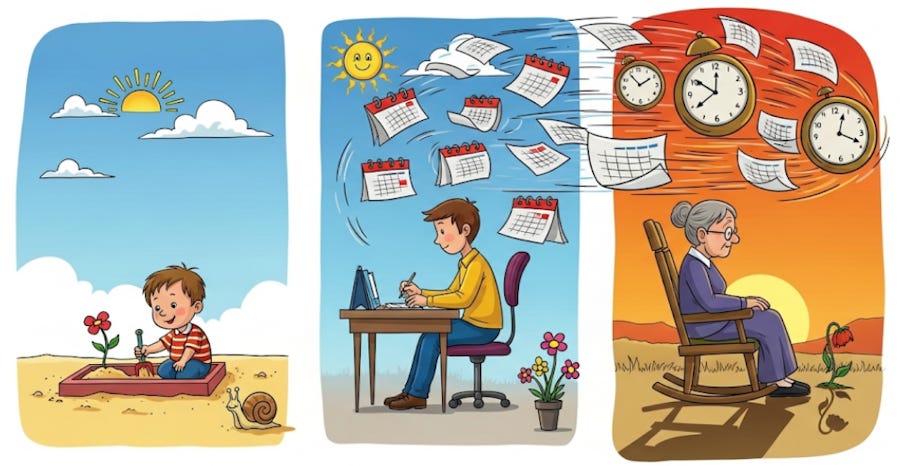It’s time to think about time
If you feel like the days are flying by, perhaps you need to fill them better
Our perception of time changes as we age, and those of us in middle age and beyond often feel that time is accelerating.
This phenomenon can be attributed to a combination of psychological and neurological factors, not a change in time itself. It’s not that time speeds up; it’s that our perception of it shifts.
One of the most popular explanations is that our sense of time is heavily influenced by new experiences and milestones.
Think back to childhood: summer holidays seemed to last forever, and a single school year felt like an eternity. This is because every day was filled with “firsts” — first bike ride, first day of school, first time seeing the ocean. These novel events create vivid memories that act as mental markers, making time feel longer.
As we age, our lives often become more routine. We drive the same route to work, do similar tasks each day, and our memories are filled with repetitive, less distinct events. Without these novel markers, the days and weeks blend together, and time seems to fly by.
Another theory, known as the proportion hypothesis, suggests our perception of a year is relative to our age. For a 10-year-old, one year is 1/10th of their entire life, which is a significant proportion. For a 50-year-old, one year is only 1/50th of their life.
As this fraction gets smaller and smaller, each year feels like a smaller portion of our existence, making time seem to pass more quickly. It’s a simple mathematical concept that intuitively makes sense.
While Albert Einstein didn’t directly address the psychological perception of time, his theories provide a different, more literal perspective on how time can be relative.
According to his theory of special relativity, time is not absolute but is dependent on the observer’s frame of reference.
The famous example he used to illustrate this is: “When you are courting a nice girl, an hour seems like a second. When you sit on a red-hot cinder, a second seems like an hour. That’s relativity.”
While he was speaking about the physical properties of time dilation in relation to speed and gravity, his witty analogy perfectly captures the subjective nature of our internal clock.
In conclusion, our internal sense of time isn’t a fixed, steady rhythm. Instead, it’s a subjective experience shaped by the novelty of our experiences, the proportion of our lives that a given period represents, and the emotional context of our moments.
It’s a testament to the fact that while we may not be able to slow down the clock, we can enrich our perception of time.
Perhaps the secret to “slowing time” isn’t to live longer, but to live better: to be more deliberate in our actions and fill each day with new joys and meaningful moments.
After all, it’s not the number of years we have, but what we do with them, that truly counts.
TheWrinkle.net is free to read, but if you like what I’m doing here, and/or
at MisterBrisbane.com and Radio Bert, you can choose to buy me a coffee.
Do you need a VPN? Following this link to get Surfshark helps me too!

